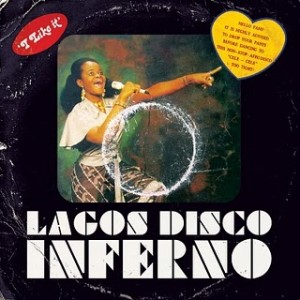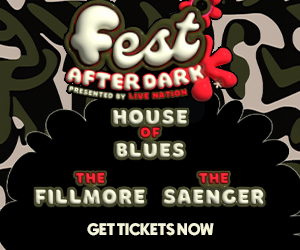 As we approach a few weeks where New Orleans music is unavoidable, I’m taking a quick time-out to listen to other stuff. LCD Soundsystem’s upcoming This is Happening is streaming now at the band’s Web site (and so far, I’m enjoying it a lot & love the self-aware “You Wanted a Hit”), and I hope to get my thoughts focused to write about Lagos Disco Inferno (a collection of disco from Nigeria from the late 1970s, some of which is pure disco, some of which is a cool hybrid) and Madlib’s Madlib Medicine Show No. 3: Beat Konducta in Africa (instrumental tracks created from obscure Afro-beat, funk and psychedelic tracks from African nations. Download a couple of tracks here).
As we approach a few weeks where New Orleans music is unavoidable, I’m taking a quick time-out to listen to other stuff. LCD Soundsystem’s upcoming This is Happening is streaming now at the band’s Web site (and so far, I’m enjoying it a lot & love the self-aware “You Wanted a Hit”), and I hope to get my thoughts focused to write about Lagos Disco Inferno (a collection of disco from Nigeria from the late 1970s, some of which is pure disco, some of which is a cool hybrid) and Madlib’s Madlib Medicine Show No. 3: Beat Konducta in Africa (instrumental tracks created from obscure Afro-beat, funk and psychedelic tracks from African nations. Download a couple of tracks here).
In the past, I’ve been pretty frothy in my affection for Black Moth Super Rainbow, a psychedelic group from Pittsburgh whose roots are in hip-hop and electronica, but it shows a lot more love for melody than either of those genres would suggest. Calling Tobacco the group’s lead singer seems slightly misleading since his voice is always heard through some sort of processing, creating the impression of a robot with a broken heart. On Tobacco’s second solo album, Maniac Meat, the robot’s ready to lash out.
Tobacco uses the same component parts as Black Moth Super Rainbow, but the emphasis changes radically. Maniac Meat is all texture and groove. Tunes are less obvious and songs feel arbitrary, starting seemingly when the recording starts, which might be before or after the first notes have been played. Or, a section of a longer performance has been extracted and presented here as the song. Black Moth Super Rainbow tracks end up being seductive because of their lyrical quality; Maniac Meat is far more disorienting and genuinely psychedelic.
Bob Seger’s latter years and Chevy commercial left him as uncool as they come, but there was a time when the Michigan-based rocker was considered an underground figure using a soul singer’s voice to bridge garage rock with the world opened up by album rock stations and the New Dylans of the early 1970s. On Early Seger, Vol. 1, you can hear his influence on the midwesterners that would follow in his footsteps.
On one hand, there’s an obvious love for guitar rock and soul. He covers the Allman Brothers’ “Midnight Rider” with the Muscle Shoals Rhythm Section, and “Gets Ya Pumpin'” is little more than a dance tune built on a beat appropriate for the title. There’s also an unfortunate need to be “artistic,” which tended to translate into slow, piano-based ballads that strive for a profundity that he doesn’t achieve.
“Get Out of Denver,” on the other hand, hits exactly right. It’s the song you wanted the early 1970s rock ‘n’ roll to produce – a song for the moment that clearly emerged from the first generation of rock ‘n’ roll without winking or performing in quotation marks. Seger and his band are speeding (though not as fast as they’d go on Live Bullet or Eddie and the Hot Rods would go later), and the amphetimized Chuck Berry track tells the story of a drug deal gone wrong that ends with a band on the run. It makes the outlaw image real, and paired with “UMC” – Seger’s dig at the upper middle class – suggests that a working class life can be grinding enough to make bandits of the best of us. That’s a story that Springsteen picked up for Nebraska, and that the Drive-By Truckers revisit regularly.



